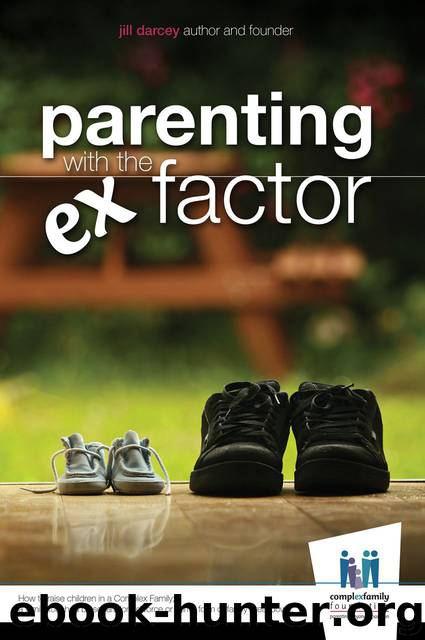Parenting with the Ex Factor by Darcey Jill

Author:Darcey, Jill [Darcey, Jill]
Language: eng
Format: epub
Publisher: Complex Family Foundation
Published: 2010-06-06T16:00:00+00:00
Discipline
Discipline of children post divorce or separation is a challenging topic to find relevant and meaningful discussion. In our modern generation we already see a decline in respect towards parents, and for that matter, for adults in positions of authority. Couple this with the devastation children feel through parental separation and we find strong influencing factors that allow poor behaviour to go on unchecked.
Let’s start with understanding discipline and the realisation that what has become normal is not natural . Discipline comes in two forms, internal and external . The majority of parenting discipline is focused on external when children are young. This is done by having the external consequences be sufficient to cause the child to make an alternative choice. This uses the Pain – Pleasure paradigm that has been taught throughout the years. That is to say, the avoidance of pain will stop us from acting a certain way, or the attainment of pleasure will have us undertake certain other ways.
However, while this achieves some desired outcomes, the most effective form of discipline is that of inner discipline that grows with maturity. This inner form is free of the external forces operating as a negative deterrent or positive incentive; instead, it becomes our personal choice to act in a constructive manner for the good of ourselves and others. It is our true intention that carries the creative power.
Taking discipline in its two basic forms, internal or external, we now add a complexity to the external component that is frequently mixed in with the term discipline . I would like to separate it out and approach this as a stand-alone issue to be discussed: punishment .
Punishment is the external penalty given for poor conduct, and is usually unrelated to the manner of the ‘crime’ committed. Using the example of robbery, the person is locked away to remove them from being able to do this again; however, this does not solve the problem caused by their act, nor deal with the reason the person made such a seemingly poor choice. Punishment also requires someone to enforce the consequence, and in a family setting, usually it is the parent. This method of control eventually dwindles as the children grow physically bigger, and as they become more independent; they rebel further unless we increase the severity of the punishments.
To adequately discipline within a Complex Family environment, we begin by accepting the difference between the Learning environment and the Performance environment. Discipline lives within a Learning environment where we develop the lesson while in the experiences so the children maintain their power of choice. Punishment, however, is within the Performance environment as it is based on the result of an action.
Let’s take this into the Complex Family environment to help to understand some key differences between traditional family discipline and the new world of complexity. Due to change in authority, time lapses and altered routines, you often have significant challenges when it comes to effectively enforcing external consequences. It is probable that groundings will not be respected at the Ex’s house.
Download
This site does not store any files on its server. We only index and link to content provided by other sites. Please contact the content providers to delete copyright contents if any and email us, we'll remove relevant links or contents immediately.
Should I Stay or Should I Go? by Ramani Durvasula(7641)
The Lost Art of Listening by Michael P. Nichols(7483)
The Rosie Project by Graeme Simsion(6359)
Beartown by Fredrik Backman(5719)
We Need to Talk by Celeste Headlee(5602)
Ego Is the Enemy by Ryan Holiday(5398)
Hunger by Roxane Gay(4916)
Suicide Notes by Michael Thomas Ford(4808)
I Love You But I Don't Trust You by Mira Kirshenbaum(3856)
Mummy Knew by Lisa James(3671)
Not a Diet Book by James Smith(3400)
Crazy Is My Superpower by A.J. Mendez Brooks(3380)
Toxic Parents by Susan Forward(3273)
Girl, Wash Your Face by Rachel Hollis(3272)
The Complete Idiot's Guide to Coping With Difficult People by Arlene Uhl(3138)
The Social Psychology of Inequality by Unknown(3011)
Name Book, The: Over 10,000 Names--Their Meanings, Origins, and Spiritual Significance by Astoria Dorothy(2966)
The Hard Questions by Susan Piver(2962)
The Gaslight Effect by Dr. Robin Stern(2785)
